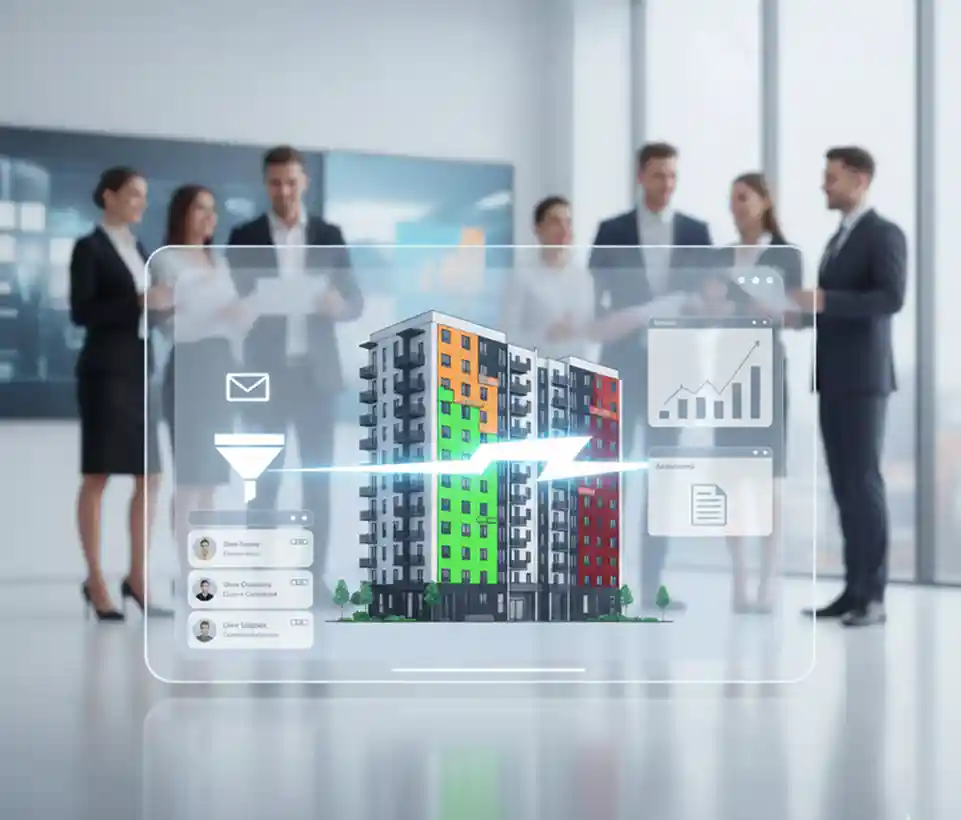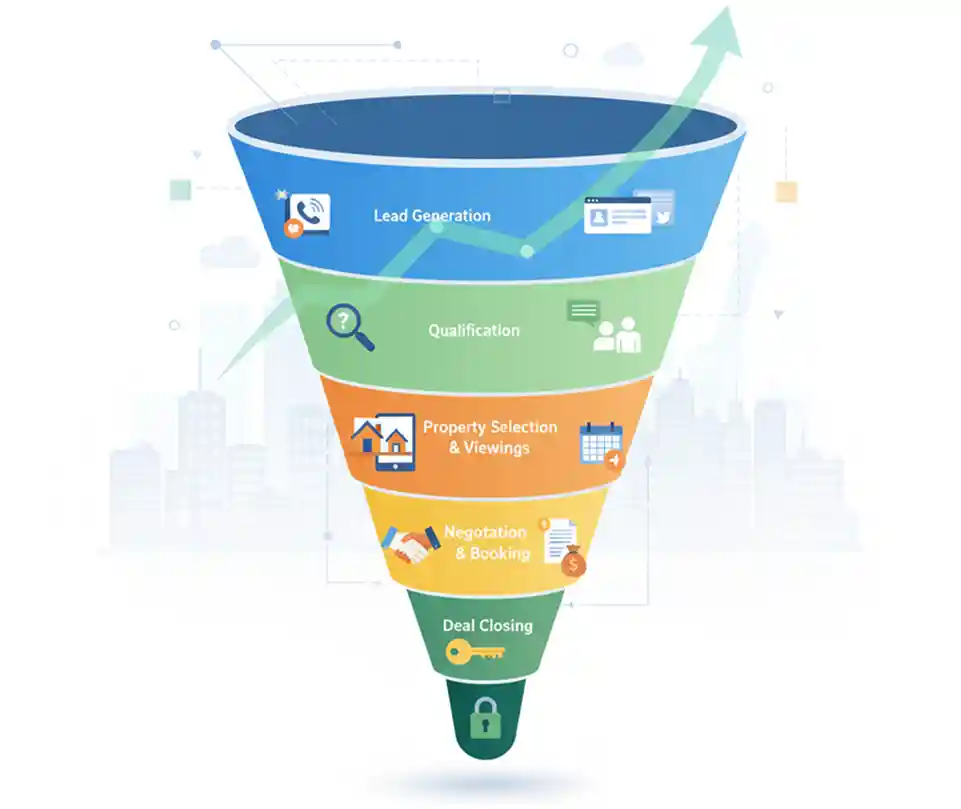
2025-11-22
Selling real estate, especially new buildings, is a complex, multi-stage process that requires perfect coordination, quick response, and a deep understanding of customer needs. In the modern world, where time is the most valuable resource, a CRM system (Customer Relationship Management) becomes a key tool that allows developers not just to manage sales, but to significantly accelerate them.
How exactly does this digital assistant optimize processes and help close new development deals much faster? Let's look at the key aspects.
1. Data Centralization and Lead Management: No Customer Gets Lost
The sales process begins with an application (lead). These leads come from various sources: calls, website, messengers, and advertising campaigns. Without a CRM system, logging and processing these applications often turns into a chaotic process using Excel spreadsheets, paper notebooks, or several disconnected services.
- Automatic Lead Collection: A modern CRM for developers automatically collects all applications from various channels (telephony, website, social networks, marketplaces) and instantly creates a customer card. This eliminates delays and the human factor.
- Single Database: All data about customers, properties, communication history, viewings, and agreements are stored in a single, secure space. The manager, regardless of when or who last communicated with the client, has a complete picture of the interaction, allowing them to quickly continue negotiations without having to "start over."
2. Up-to-Date "Availability Grid" in Real-Time
For a new build buyer, the critical question is: "Which apartment is currently available and what is its current price?" If the manager spends time verifying data across different tables, this slows down the process and significantly increases the risk of error.
- Instant Status Updates: Specialized real estate CRM systems feature an integrated Unit/Apartment Availability Grid (often called a "Shahmatka"). When an apartment is reserved or sold, its status is updated in the system instantly.
- 1-Click Reservation: The manager can reserve the property selected by the client directly from the mobile app or desktop interface. This prevents the common problem of two clients being offered the same apartment, which can lead to conflicts and lost deals.
- Website Integration: The best solutions synchronize the Availability Grid with the developer's website, providing buyers with up-to-date information 24/7.
3. Automation of Routine and Communication Acceleration
The time a manager spends on routine tasks (filling out reports, creating documents, setting reminders) is time not spent on direct sales. CRM automates these processes.
- Task Automation: The system itself reminds the manager of the need to call the client back, send a presentation, or clarify the payment status. This ensures the continuity of the sales process.
- Document Templates: Creating contracts, invoices, and supplementary agreements using ready-made templates is done in one click. The CRM automatically pulls in customer and property data, minimizing errors and reducing document preparation time from hours to mere minutes.
- IP-Telephony and Messengers: Integration with communication channels allows managers to make calls and chat directly from the customer card, and the entire history of calls and messages is automatically saved for transparency.
4. Accurate Analytics for Decision Making
The speed of sales directly depends on the quality of management decisions. CRM provides sales and marketing leadership with objective data for analysis.
- Sales Funnel Transparency: The manager or executive sees at what stage clients are "stuck," how long each stage takes (e.g., from the first call to viewing), and where intervention is needed.
- Efficiency Control: The system automatically generates reports on the efficiency of each manager, the source of leads (where the most profitable clients originate), and the profitability of advertising campaigns (ROI).
- Forecasting: Based on historical data, CRM can help forecast sales volumes and cash flow, which is critically important for construction planning and financial management.
5. Personalized Approach
Real estate sales are always a personal matter. The more accurately the manager meets the client's specific needs, the faster the deal closes.
Thanks to the complete interaction history (what the client was interested in, what questions they asked, which properties they viewed), the CRM allows the manager to offer the most relevant options and personalized conditions. This increases trust, reduces the time spent searching for the "ideal apartment," and consequently, accelerates the sale.
➡️ Conclusion
A CRM system is not just a database, but a sales catalyst for new developments. It transforms chaotic processes into a well-coordinated mechanism:
- Ensures fast and high-quality lead processing.
- Guarantees 100% data relevance on properties.
- Frees managers from routine tasks, allowing them to focus on communicating with clients.
- Provides management with tools for analysis and quick strategy adjustment.
The implementation of a specialized CRM solution, such as Confidence CRM, becomes not just a desire, but a necessity for a developer aiming for a fast, transparent, and scalable business.
Learn more about the functions and integration capabilities that will help your sales department work more efficiently in our article on CRM plugins
Recent post
Tagscloud
- CRM
- RealEstateCRM
- NewDevelopmentSales
- PropertySales
- FasterSales
- RealEstateTechnology
- DeveloperCRM
- ConstructionSales
- LeadManagement
- SalesAutomation
- RealEstateMarketing
- PropTech
- CRMSoftware
- SalesProcessOptimization
- PropertyManagement
- HousingMarket
- SellingNewBuilds
- DigitalTransformation
- PipelineManagement
- QuickSale
Subscribe our weekly subscription
Add some text to explain benefits of subscripton on your services. We'll send you the best of our blog just once a weekly.
_11zon.webp)
